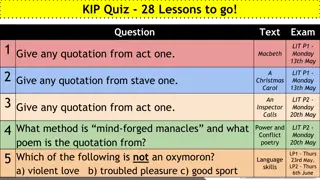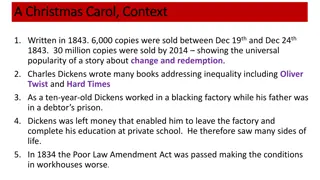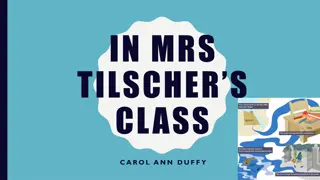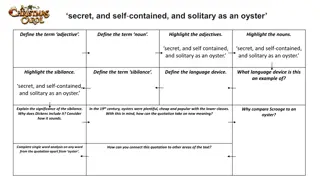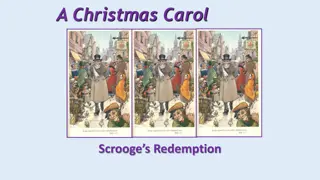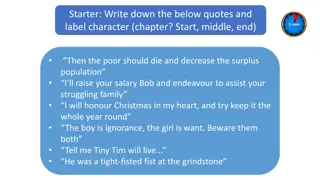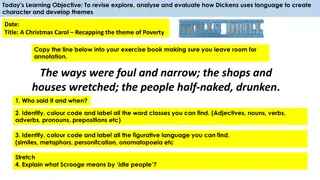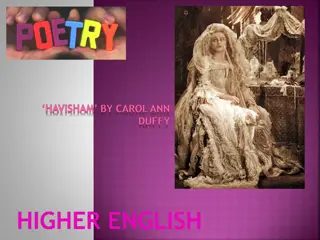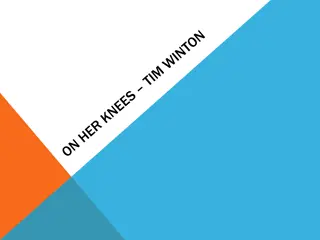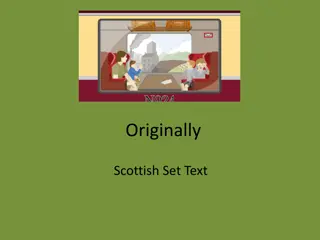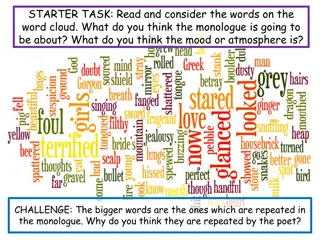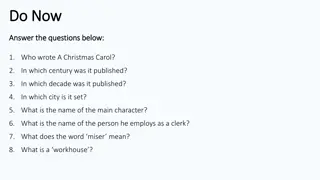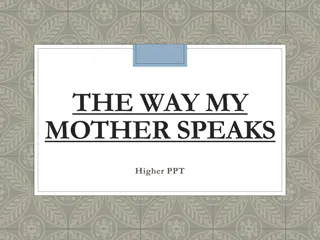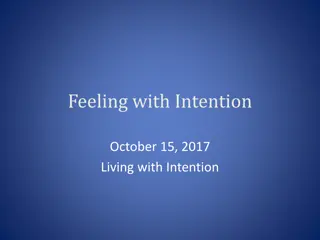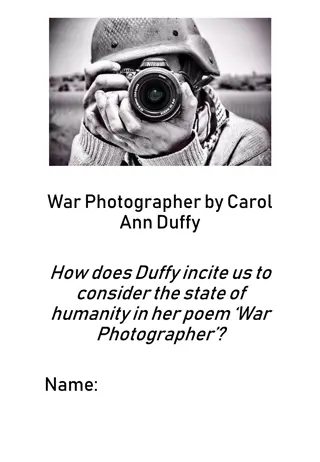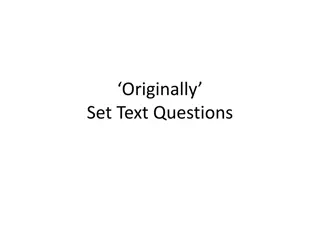Exploring Strong Feelings of Emigration in "The Emigré" by Carol Rumens
The poem "The Emigré" by Carol Rumens delves into the memories and emotions of an emigrant recalling their homeland. The speaker reminisces about a faraway city from their childhood, contrasting their innocent perception with the reality of their homeland. Strong emotions are depicted through vivid imagery and metaphors, capturing the bittersweet essence of displacement and nostalgia. Through the portrayal of conflicting emotions and the impact of time on one's perception, the poem evokes a poignant reflection on the complexities of identity and belonging.
Download Presentation

Please find below an Image/Link to download the presentation.
The content on the website is provided AS IS for your information and personal use only. It may not be sold, licensed, or shared on other websites without obtaining consent from the author. Download presentation by click this link. If you encounter any issues during the download, it is possible that the publisher has removed the file from their server.
E N D
Presentation Transcript
The Emigre Carol Rumens How does Rumens present strong feelings in The Emigr e ? An emigr e is the feminine form of the French word meaning emigrant one who has left the country of their birth to settle elsewhere
Context The poem explores the memory of the speaker and their experiences in a faraway city they spent time in as a child. The poet reminisces about the place through her childhood eyes, although we see conflict between this and her adult perception of her homeland. An emigr e is usually the term for someone who has to leave a country for political or social reasons.
There once was a country I left it as a child but my memory of it is sunlight-clear for it seems I never saw it in that November which, I am told, comes to the mildest city. The worst news I receive of it cannot break my original view, the bright, filled paperweight. It may be at war, it may be sick with tyrants, but I am branded by an impression of sunlight. The white streets of that city, the graceful slopes glow even clearer as time rolls its tanks and the frontiers rise between us, close like waves. That child s vocabulary I carried here like a hollow doll, opens and spills a grammar. Soon I shall have every coloured molecule of it. It may by now be a lie, banned by the state but I can t get it off my tongue. It tastes of sunlight. CHALLENGE: What is happening to her country of origin? Read the metaphor in the last line of stanza 2: what does it imply about the speaker s feelings about her country of origin?
What do you learn about the place in the poem? This poem is about a displaced person who pictures in her mind the country or city where s/he was born. 1. Highlight in 2 different colours on your poem the memory city and current city 2. In your book, make 2 columns. Label one memory city and the other current city . List the facts provided by the speaker about each place described. 3. Do we know the name of the place? Why is this? 4. Do you think the speaker was happy there? Do you think that the passage of time has affected the speaker? Explain and use evidence.
Context continued Rumens is English and has no experience of emigration but left the place unspecific so it could apply to many different people s experiences. The poet bases many of the ideas on modern examples of emigration from countries like Russia or the Middle East where people are fleeing corruption and tyranny, or those countries that change in their absence to some form of dictatorship.
I have no passport, theres no way back at all but my city comes to me in its own white plane. It lies down in front of me, docile as paper; I comb its hair and love its shining eyes. My city takes me dancing through the city of walls. They accuse me of absence, they circle me. They accuse me of being dark in their free city. My city hides behind me. They mutter death, and my shadow falls as evidence of sunlight.
First impressions TASK: Using the highlighted quotes on the poem comment on: What technique has been used The effect of that technique TIP: Better responses will think of more than one interpretation.
my memory of it is sunlight clear Find where the poet uses colour in the poem. Is there a pattern or a change? What meaning can you deduce from the way that colour is used?
That childs vocabulary What does the speaker of the poem have to say about the language of the place described? Why do you think the speaker describes the language of the place described as a hollow doll ? What do you think the speaker in the poem is trying to express when they say that they can t get it ( the language) off my tongue ?
I comb its hair and love its shining eyes What could this mean? Critic Ben Wilkinson said of Carol Rumens; she has a fascination with elsewhere . To what extent does the speaker in this poem convey a longing for the past? Where is the memory located? How is the place idealised? To what extent is the speaker s use of place an extended metaphor?
Read the analysis of the poem on the sheet Highlight key points
How does the structure of the poem reflect the speaker s feelings? How many verses/stanzas? How many lines in each stanza? Do the stanzas follow a similar pattern? What is it? What meaning could be attached to your findings? How is a tone of longing or unease conveyed in the structure of the poem?
Form and structure The poem follows a threestanza structure with repetitive elements such as the idea of sunlight . The opening seems to encompass the speaker trying to capture the memory; the second stanza fleshes out the city in her mind; finally the poem seems to veer towards an idea of facing up to the modern, dark place her city of memory has become. The poem uses enjambment to create a fluid, natural pace to the narrator s thought process, as though she is thinking out loud and yet to find a conclusion. Final stanza more end stopped lines = trapped?
Re-read the poem Where phrases have been underlined, annotate your poem, using technical terms and explanation of effect.
. for it seems I never saw it in that November which, I am told, comes to the mildest city. The worst news I receive of it cannot break my original view, the bright, filled paperweight. It may be at war, it may be sick with tyrants, but I am branded by an impression of sunlight. The white streets of that city, the graceful slopes glow even clearer as time rolls its tanks and the frontiers rise between us, close like waves. That child s vocabulary I carried here like a hollow doll, opens and spills a grammar. Soon I shall have every coloured molecule of it. It may by now be a lie, banned by the state but I can t get it off my tongue. It tastes of sunlight. I have no passport, there s no way back at all but my city comes to me in its own white plane. It lies down in front of me, docile as paper; I comb its hair and love its shining eyes. My city takes me dancing through the city of walls. They accuse me of absence, they circle me. They accuse me of being dark in their free city. My city hides behind me. They mutter death, .
How does the ending of the poem suggest that the speaker s relation ship with the past is not necessarily a positive one? Look at the last 4 lines. What do they suggest to you? They accuse me of absence, they circle me. They accuse me of being dark in their free city. My city hides behind me. They mutter death, And my shadow falls as evidence of sunlight.
Complete your chart Rs of add to your unmarked chart. What does branded suggest? I comb its hair and love its shining eyes What metaphor is being continued here? There once was a country Why does it start like a fairystory?
Copy and complete the table: IDEA EVIDENCE ANALYSIS Complete this table. Complete any Rs on your Emigree chart Which poems would you compare to this one? Why? Exile: The speaker seems to be an exile from an unknown city. Semantic field of war: Words and phrases associated with TV reporting of war used throughout. Light and shade: References to sunlight are repeated. The repeated references to sunlight suggest the speaker has an idealised, almost dream-like picture of the past, where it is always sunny. However, the place is not as perfect as she remembers it and mentions of dark and death imply that things are not as ideal as her memories suggest. There is a sense that her relationship with the place may be threatening to her in some way.
IDEA EVIDENCE ANALYSIS Exile: The speaker seems to be an exile from an unknown city. migr e , I left it as a child , the frontiers rise between us , there s no way back Perhaps this mysterious and now unreachable city the speaker recollects is meant to represent the past, to which they can t return. The use of the extended metaphor suggest that this continues to bother them, that they cannot escape their past or what it means to them. Semantic field of war: Words and phrases associated with TV reporting of news used throughout. Vocabulary of the newsroom - worst news , at war , tyrants , rolls its tanks , banned by the state . The language choices used throughout the poem depict a war-torn country under the control of a brutal government. If the speaker s memories are of childhood, perhaps these terms are meant to represent the harsh realities of the adult world and how others would see this city, through the medium of tv. Light and shade: References to sunlight are repeated. sunlight-clear , branded by sunlight , bright, filled paperweight , the white streets , tastes of sunlight , being dark , my shadow falls as evidence of sunlight . The repeated references to sunlight suggest the speaker has an idealised, almost dream-like picture of the past, where it is always sunny. However, the place is not as perfect as she remembers it and mentions of dark and death imply that things are not as ideal as her memories suggest. There is a sense that her relationship with the place may be threatening to her in some way.
Language A large amount of imagery is used to try and capture the concept of the city, including personification, though much of this is deliberately vague. The feeling of uncertainty is further enhanced by some of the unusual and unnatural links between ideas and choice of metaphors. Vocabulary associated with war, invasion and tyranny contrasts with her idealistic image of the city. Anecdotal: There once was a country , as though she is engaging us with a story. Personification of the city: highlights the importance of her home to her. Contrast positive/negative language: illustrates the difference between her perception of her home, and the reality.
There once was a country I left it as a child but my memory of it is sunlight-clear for it seems I never saw it in that November which, I am told, comes to the mildest city. The worst news I receive of it cannot break my original view, the bright, filled paperweight. It may be at war, it may be sick with tyrants, but I am branded by an impression of sunlight.
The white streets of that city, the graceful slopes glow even clearer as time rolls its tanks and the frontiers rise between us, close like waves. That child s vocabulary I carried here like a hollow doll, opens and spills a grammar. Soon I shall have every coloured molecule of it. It may by now be a lie, banned by the state but I can t get it off my tongue. It tastes of sunlight.
I have no passport, theres no way back at all but my city comes to me in its own white plane. It lies down in front of me, docile as paper; I comb its hair and love its shining eyes. My city takes me dancing through the city of walls. They accuse me of absence, they circle me. They accuse me of being dark in their free city. My city hides behind me. They mutter death, and my shadow falls as evidence of sunlight.
Ellipsis creates uncertainty as the place is not named. Preposition suggests that the place has changed so much that it no longer exists. Positive natural image suggests that she has positive memories or is she blinded by these memories? Enjambment implies that he feelings, the place and her memories are chaotic. Metaphor suggests that her memory is fixed, cannot be changed, and provides stability in her life. There once was a country I left it as a child but my memory of it is sunlight-clear for it seems I never saw it in that November which, I am told, comes to the mildest city. The worst news I receive of it cannot break my original view, the bright, filled paperweight. It may be at war, it may be sick with tyrants, but I am branded by an impression of sunlight. Personification indicates a close, loving, relationship between her and her home city. Negative metaphor suggests painful experiences, juxtaposed with the repetition of the positive imagery demonstrates the good and bad of the place and possibly her biased view of it. No rhyme with long sentences reflects the chaotic environment. Almost regular stanza length suggests that this chaos is constant. Is she trying to impose order on her memories?
Positive imagery suggests that it s a beautiful place white may portray the memories as idealised too perfect. Metaphor emphasises the power of time while the t sounds mimic a clock. The power of the memories are extreme if they can overcome time. Simile using childish verbs portray the memory as powerful but possibly empty and misleading. The white streets of that city, the graceful slopes glow even clearer as time rolls its tanks and the frontiers rise between us, close like waves. That child s vocabulary I carried here like a hollow doll, opens and spills a grammar. Soon I shall have every coloured molecule of it. It may by now be a lie, banned by the state but I can t get it off my tongue. It tastes of sunlight. Connotations of tyranny and violence as in the first stanza, could indicate why she left. Sensory details emphasise the power of the experience and that it is still with her. Caesura highlights the contrast between the positive and negative aspects
Personification repeated indicates a close, loving, relationship between her and her home city. What do the different ideas suggest? Negative language suggests that the place has changed so much that it no longer exists, or that she has changed too much to see it that way. From a distance, she has no control. Symbolism could suggest that she reads about it in the newspaper. I have no passport, there s no way back at all but my city comes to me in its own white plane. It lies down in front of me, docile as paper; I comb its hair and love its shining eyes. My city takes me dancing through the city of walls. They accuse me of absence, they circle me. They accuse me of being dark in their free city. My city hides behind me. They mutter death, and my shadow falls as evidence of sunlight. More caesuras suggests greater conflict than earlier on in the poem. Repetition adds to the sense of conflict between her and others. Contrasting colours juxtaposes different views of the place suggesting a number of perspectives. Juxtaposition continued in the final image to imply that the city still contains both good and bad. However, Repetition of sunlight suggests that the good is more powerful and everlasting.



